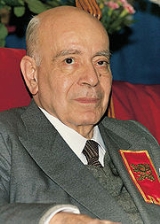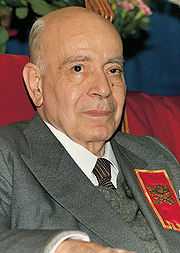
Catholic Electoral League
Encyclopedia
The Catholic Electoral League (LEC - Liga Eleitoral Catolica) was a Brazil
ian political pressure group functioning from 1932-1937 under the direct auspices of the Catholic Church
. It was formed as part of a larger Church effort to "re-Catholicize" Brazil after a period of increased secularism
and liberalism
in Brazilian society in the aftermath of World War I
.
led to the crash of the coffee market in 1929, leading to a financial collapse in which much of the rural aristocracy
lost most of their wealth. Society was becoming more urbanized, with large cities overtaking the more traditional rural regions in political influence. In 1930 a liberal, communist
-backed revolution overthrew conservative president Washington Luis Pereira de Sousa
. The early populist
policies of the new government under Getulio Vargas
(1930-1945) accelerated the decline of the traditional authority of the landed aristocracy and the Church.
In 1932, the upper classes from the state of São Paulo
rebelled in an attempt to stop this political slide. Their Constitutionalist Revolution
failed, but in response, Getulio Vargas convoked a constitutional assembly to revamp the country’s political organization.
 Realizing the importance of the upcoming constitutional assembly, Plinio Corrêa de Oliveira
Realizing the importance of the upcoming constitutional assembly, Plinio Corrêa de Oliveira
, with his friends Alceu de Amoroso Lima (a writer and recent convert to Catholicism) and Heitor da Silva Costa
(architect of the famous statue of Christ the Redeemer
in Rio de Janeiro
), conceived the idea of the Catholic Electoral League. Its purposes would include providing voter guides so Catholics would know which candidates were more favorable to the Catholic cause. Cardinal
Sebastião Leme, Archbishop
of Rio de Janeiro and leader of the Brazilian bishop
s, sanctioned the plan, and soon the League was active all over Brazil.
The League's platform called for the reintroduction of obligatory religious instruction in public schools, the banning of divorce, civil recognition of religious marriage, and the establishment of chaplaincies in the armed forces and prisons. It also called for the right to vote for clergy, and state subsidies for the Catholic Church.
Olveira, now secretary-general of the Archdiocesan Board of the League in São Paulo, was chosen by Cardinal Duarte Leopoldo e Silva as a Catholic coalition candidate to the constitutional assembly. In the election, Olveira, then twenty-four years old, received more votes than any other candidate in Brazil, and nearly twice that of any other São Paulo candidate.
At the constitutional convention Olveira and other League-supported delegates were successful in incorporating the entirety of the League’s platform into the new constitution of 1934.
Having so successfully accomplished its initial purposes, the League slowly fell out of prominence in the years following the constitutional assembly, and ceased to function after 1937.
Brazil
Brazil , officially the Federative Republic of Brazil , is the largest country in South America. It is the world's fifth largest country, both by geographical area and by population with over 192 million people...
ian political pressure group functioning from 1932-1937 under the direct auspices of the Catholic Church
Roman Catholic Church
The Catholic Church, also known as the Roman Catholic Church, is the world's largest Christian church, with over a billion members. Led by the Pope, it defines its mission as spreading the gospel of Jesus Christ, administering the sacraments and exercising charity...
. It was formed as part of a larger Church effort to "re-Catholicize" Brazil after a period of increased secularism
Secularism
Secularism is the principle of separation between government institutions and the persons mandated to represent the State from religious institutions and religious dignitaries...
and liberalism
Liberalism
Liberalism is the belief in the importance of liberty and equal rights. Liberals espouse a wide array of views depending on their understanding of these principles, but generally, liberals support ideas such as constitutionalism, liberal democracy, free and fair elections, human rights,...
in Brazilian society in the aftermath of World War I
World War I
World War I , which was predominantly called the World War or the Great War from its occurrence until 1939, and the First World War or World War I thereafter, was a major war centred in Europe that began on 28 July 1914 and lasted until 11 November 1918...
.
Historical Setting
In the late 1920s and early 1930s Brazil was beset by several crises. The Great DepressionGreat Depression
The Great Depression was a severe worldwide economic depression in the decade preceding World War II. The timing of the Great Depression varied across nations, but in most countries it started in about 1929 and lasted until the late 1930s or early 1940s...
led to the crash of the coffee market in 1929, leading to a financial collapse in which much of the rural aristocracy
Aristocracy
Aristocracy , is a form of government in which a few elite citizens rule. The term derives from the Greek aristokratia, meaning "rule of the best". In origin in Ancient Greece, it was conceived of as rule by the best qualified citizens, and contrasted with monarchy...
lost most of their wealth. Society was becoming more urbanized, with large cities overtaking the more traditional rural regions in political influence. In 1930 a liberal, communist
Communism
Communism is a social, political and economic ideology that aims at the establishment of a classless, moneyless, revolutionary and stateless socialist society structured upon common ownership of the means of production...
-backed revolution overthrew conservative president Washington Luis Pereira de Sousa
Washington Luís Pereira de Sousa
Washington Luís Pereira de Sousa was a Brazilian politician. His family was of Portuguese Romani descent. He was born in Macaé, Rio de Janeiro, and moved to São Paulo, where he became a lawyer. Elected governor of São Paulo state in 1920 and president of Brazil in 1926, Washington Luís was the...
. The early populist
Populism
Populism can be defined as an ideology, political philosophy, or type of discourse. Generally, a common theme compares "the people" against "the elite", and urges social and political system changes. It can also be defined as a rhetorical style employed by members of various political or social...
policies of the new government under Getulio Vargas
Getúlio Vargas
Getúlio Dornelles Vargas served as President of Brazil, first as dictator, from 1930 to 1945, and in a democratically elected term from 1951 until his suicide in 1954. Vargas led Brazil for 18 years, the most for any President, and second in Brazilian history to Emperor Pedro II...
(1930-1945) accelerated the decline of the traditional authority of the landed aristocracy and the Church.
In 1932, the upper classes from the state of São Paulo
São Paulo
São Paulo is the largest city in Brazil, the largest city in the southern hemisphere and South America, and the world's seventh largest city by population. The metropolis is anchor to the São Paulo metropolitan area, ranked as the second-most populous metropolitan area in the Americas and among...
rebelled in an attempt to stop this political slide. Their Constitutionalist Revolution
Constitutionalist Revolution
The Constitutionalist Revolution of 1932 is the name given to the uprising of the population of the Brazilian state of São Paulo against the 1930 coup d'état whereby Getúlio Vargas assumed the nation's Presidency; Vargas was supported by the military and the political elites of Minas Gerais, Rio...
failed, but in response, Getulio Vargas convoked a constitutional assembly to revamp the country’s political organization.
Foundation of the League

Plinio Corrêa de Oliveira
Plinio Correa de Oliveira was a Brazilian intellectual, politician and Catholic activist....
, with his friends Alceu de Amoroso Lima (a writer and recent convert to Catholicism) and Heitor da Silva Costa
Heitor da Silva Costa
Heitor da Silva Costa was a Brazilian civil engineer, designer and constructor of the Christ the Redeemer monument in Rio de Janeiro....
(architect of the famous statue of Christ the Redeemer
Christ the Redeemer (statue)
Christ the Redeemer is a statue of Jesus Christ in Rio de Janeiro, Brazil; considered the largest Art Deco statue in the world and the 5th largest statue of Jesus in the world. It is tall, including its pedestal, and wide. It weighs 635 tonnes , and is located at the peak of the Corcovado...
in Rio de Janeiro
Rio de Janeiro
Rio de Janeiro , commonly referred to simply as Rio, is the capital city of the State of Rio de Janeiro, the second largest city of Brazil, and the third largest metropolitan area and agglomeration in South America, boasting approximately 6.3 million people within the city proper, making it the 6th...
), conceived the idea of the Catholic Electoral League. Its purposes would include providing voter guides so Catholics would know which candidates were more favorable to the Catholic cause. Cardinal
Cardinal (Catholicism)
A cardinal is a senior ecclesiastical official, usually an ordained bishop, and ecclesiastical prince of the Catholic Church. They are collectively known as the College of Cardinals, which as a body elects a new pope. The duties of the cardinals include attending the meetings of the College and...
Sebastião Leme, Archbishop
Archbishop
An archbishop is a bishop of higher rank, but not of higher sacramental order above that of the three orders of deacon, priest , and bishop...
of Rio de Janeiro and leader of the Brazilian bishop
Bishop
A bishop is an ordained or consecrated member of the Christian clergy who is generally entrusted with a position of authority and oversight. Within the Catholic Church, Eastern Orthodox, Oriental Orthodox Churches, in the Assyrian Church of the East, in the Independent Catholic Churches, and in the...
s, sanctioned the plan, and soon the League was active all over Brazil.
The League's platform called for the reintroduction of obligatory religious instruction in public schools, the banning of divorce, civil recognition of religious marriage, and the establishment of chaplaincies in the armed forces and prisons. It also called for the right to vote for clergy, and state subsidies for the Catholic Church.
Influence on the Constitution of 1934
The League quickly embarked upon a campaign to ensure that delegates favorable to its positions would be elected to the 1933 constitutional assembly. The League screened candidates according to their commitment to traditional Catholic principles, and issued voter's guides with League recommendations. The League urged voters to support only candidates who were firmly loyal to the Church.Olveira, now secretary-general of the Archdiocesan Board of the League in São Paulo, was chosen by Cardinal Duarte Leopoldo e Silva as a Catholic coalition candidate to the constitutional assembly. In the election, Olveira, then twenty-four years old, received more votes than any other candidate in Brazil, and nearly twice that of any other São Paulo candidate.
At the constitutional convention Olveira and other League-supported delegates were successful in incorporating the entirety of the League’s platform into the new constitution of 1934.
Having so successfully accomplished its initial purposes, the League slowly fell out of prominence in the years following the constitutional assembly, and ceased to function after 1937.

